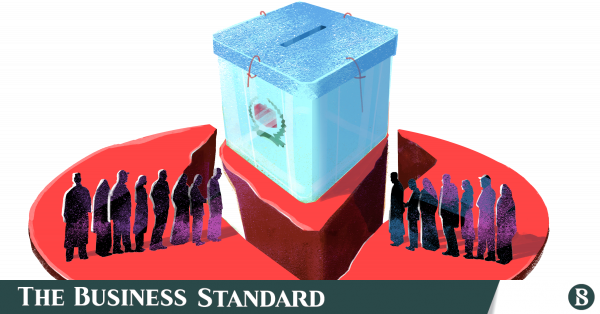Grocery stores, homes and even godowns – these are what The Business Standard stumbled upon when visiting the so-called central offices of some of the 65 political party aspirants.
In the first phase of new party registration, the parties submitted applications to the Election Commission (EC).
One of the prerequisites of getting a registration is to have a central office. Many of these parties thus gave addresses for their central office as needed. But during our visit, we did not see any political activity.
Some parties, when asked, even admitted to not having a central office. One such party is the “Bangladesh Probashi Kalyanmoy Party”.
On paper, its address is House-16, Ramakant Nandi Lane in Old Dhaka. In reality, such a central office doesn’t exist. On location, even a signboard cannot be found.
The structure has a residential building and a grocery store on the ground floor.
When the building owner was asked about the party office, he expressed surprise.
Requesting not to be named, he said, “My building mainly has families living in it. On the ground floor are some ghee wholesale shops. This is the first time I am hearing about this party. I have never seen their activities here.”
Contacted over phone, Shipon Bhuiyan, chairman of the Bangladesh Probashi Kalyanmoy Party, hurriedly arrived at the scene.
He ushered the reporter to follow him to an alley next to the building. There, he opened a locked door. It was a storeroom.
“This is our office,” he claimed.
The room was about 20-30 square feet. Various pieces of glass were stored here and there.
Right next to it, in full view, was a ghee factory and another shop.
“We will make this the party office. Now we are using it as a store room. I have told the boys to clean it. Chairs and tables will be brought here in a day or two,” Shipon said.
Asked why he wanted to join politics, he said he did not like the current state of the country.
“That is why I am forming a party myself.”
Shipon said he was a former expatriate and current ones were the supporters of his party.
Not just a party, but also a university?
The next stop was the Nucleus Party.
This time, the address was in Paschim Kafrul, Sher-e-Bangla Nagar.
The holding number given was not found and the party’s secretary general was called.
He gave the address of another place, mentioning a well-known nearby market.
But once there, all that could be seen was a residential building, but no signboard.
Speaking to The Business Standard, party’s Secretary General SMD Zethan said the owner of the building was the chairman of the party.
“We will take one floor of this building for the office. We have not received it yet. The EC has extended the time by two months. We will take it within that time. Then the signboard will also be installed,” he said.
Claiming that the Nucleus Party was not just a party, but would also become an institution and a university, he said, “We will soon start courses. We will give theoretical and practical ideas and teach about how a politician should be, what his personality should be, etc. The leaders who will be in our party will be political party consultants. They will consult other parties as well.”
Another office yet another home
The next stop on the list was 27, Shashi Mohan Basak Lane in Wari.
This was supposed to be the central office of the Bangladesh Justice Party (BJP). Currently, it was only a residential building.
The building owner said there was no political party in the building.
The person who used this address used to live here, but no longer lives here, he said.
In the capital’s Dilkusha area, the Bangladesh Janshakti Party claims to have its central office.
Currently, not a single person in the building could provide any information on it.
Again, there was no signboard in sight.
On 10 March, the EC issued a notification for the registration of political parties. Initially, the application deadline was till 20 April, but it was later extended to 22 June.
So far, 65 parties have applied for registration.
An Election Commission official, speaking on the condition of anonymity, said most of the parties which had applied were small-scale.
“We have not seen any political activities of them.”
Whether the parties get registration or not depends on what happens after the EC’s verification, including checking the central offices.
The EC can reject the application.
In this regard, the official said, “The documents of the applicant parties will be verified. If any party does not meet the conditions, then naturally their application will be rejected.”
Since the political party registration process was launched in 2008, 49 new parties have been registered so far.


